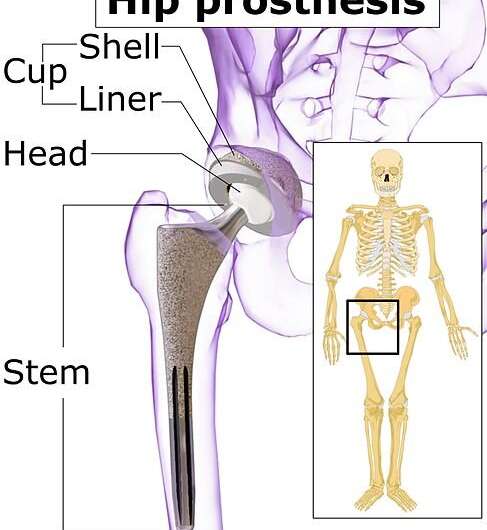This article has been reviewed according to Science X's editorial process and policies. Editors have highlighted the following attributes while ensuring the content's credibility:
fact-checked
trusted source
proofread
Assessing the cardiac risks of cobalt in hip replacements

A technique for measuring the cardiac risk associated with cobalt-containing hip replacements has been highlighted for the first time in research at the University of Strathclyde.
Some hip replacements can contain the metal and could potentially affect heart function in some patients. The study has also identified, for the first time, a link between cobalt-induced changes in calcium levels in heart muscle cells and reduced contraction of the heart.
The Strathclyde study aimed to investigate the damaging effects of cobalt on heart cells and tissue. The research team examined a potential relationship between cobalt exposure and changes in the levels and activity of a protein called CaMKII. This protein is known to play a central role in regulating heart function in both health and disease.
The researchers looked at the best way to measure cobalt-induced effects in patients. Global longitudinal strain, a sensitive form of ultrasound, was found to be a good way of measuring which hip replacement patients are most at risk of heart complications. The researchers also measured the impact of cobalt across a range of experimental settings, including its effects on two types of heart cells and on cardiovascular function in both a laboratory model and humans.
The research demonstrated that cobalt, even at low levels, can reduce heart contraction, making the heart less efficient at pumping blood around the body. Calcium plays a key role in regulating heart contraction and it is thought that the effects of cobalt on CaMKII and calcium levels within the heart cells contributes to this reduction in contraction. The results from the study highlight the potential for both early intervention and prevention of damaging effects of cobalt in the heart.
The research team comprised scientists in Strathclyde Institute of Pharmacy and Biomedical Sciences (SIPBS) and the University's Department of Biomedical Engineering, along with Orthopedic clinicians at Queen Elizabeth University Hospital.
Dr. Susan Currie, a reader in SIPBS, is leading the research. She said, "Hip replacements are the current treatment for advanced cases of arthritis. However, there is now very strong evidence of a link between hip replacements where metals such as cobalt and chromium are used in the artificial joint bearings, and the possibility of developing heart complications.
"While not all hip replacements contain cobalt, for those that do, cobalt levels can rise over time in the bloodstream of patients and the metal can accumulate in various organs of the body, including the heart. Left untreated, this can damage the heart and, in some cases, lead to heart failure, but doctors cannot tell whether, or when, hip replacement patients will develop heart complications.
"Despite the knowledge that cobalt in some hip replacements has the potential to cause heart complications, our research is the first time a robust way of measuring risk has been found. This is also the first time that a link between cobalt-induced changes in calcium levels in heart muscle cells and reduced contraction of the heart has been identified. Cementing this knowledge will allow further study to focus on new treatments to reduce or prevent the toxic effects of cobalt in patients with hip replacements.
"Our findings confirm a mechanism by which cobalt can negatively impact heart function. This has significant implications in terms of care for people who have received hip replacements which contain cobalt and who therefore may be at increased risk for the development of longer-term cardiac complications."





















